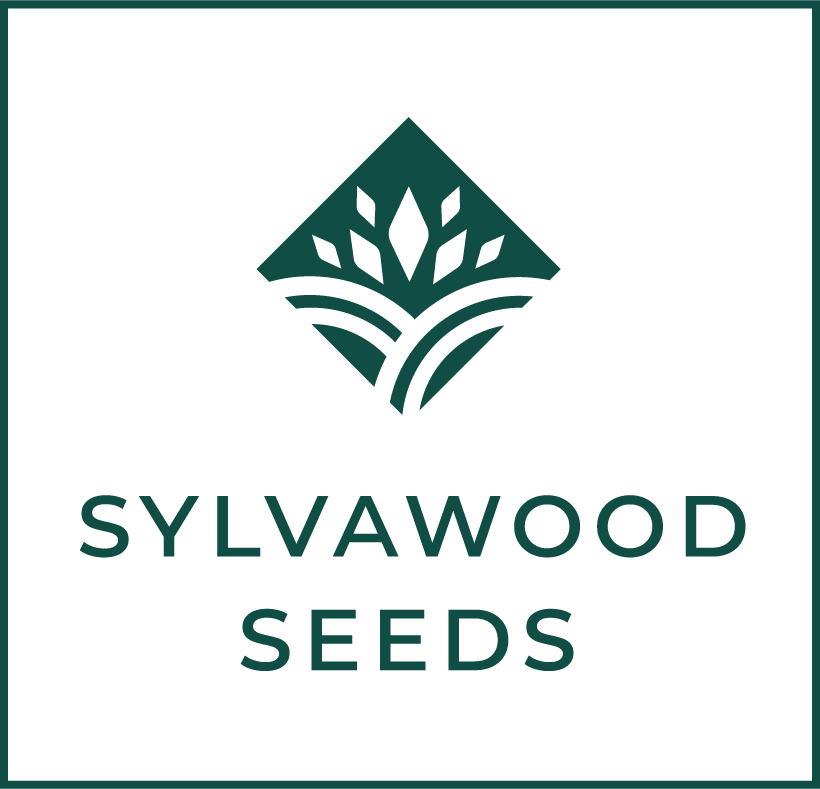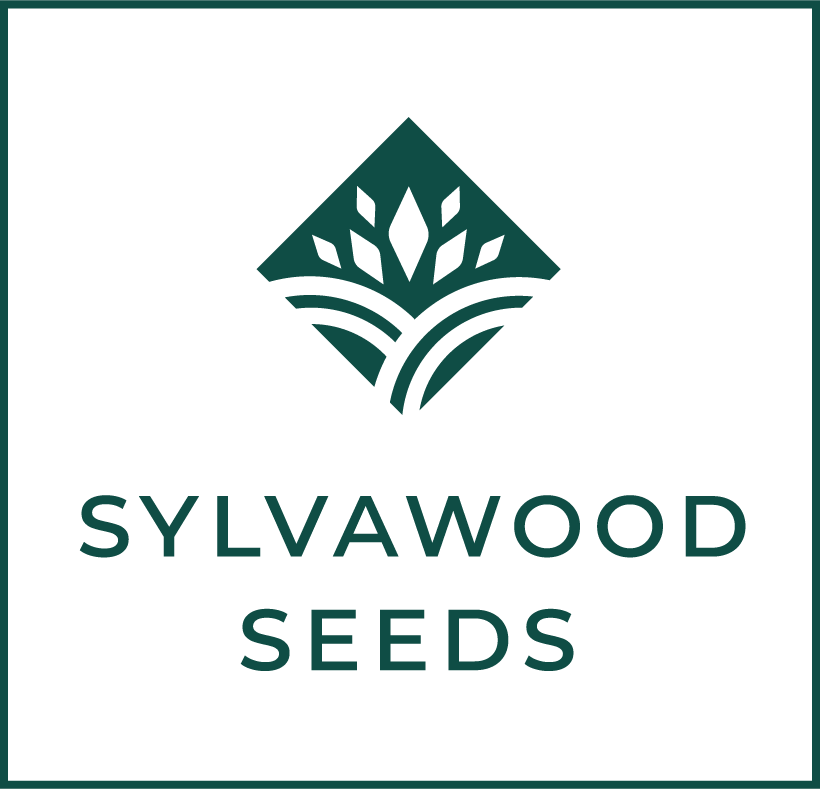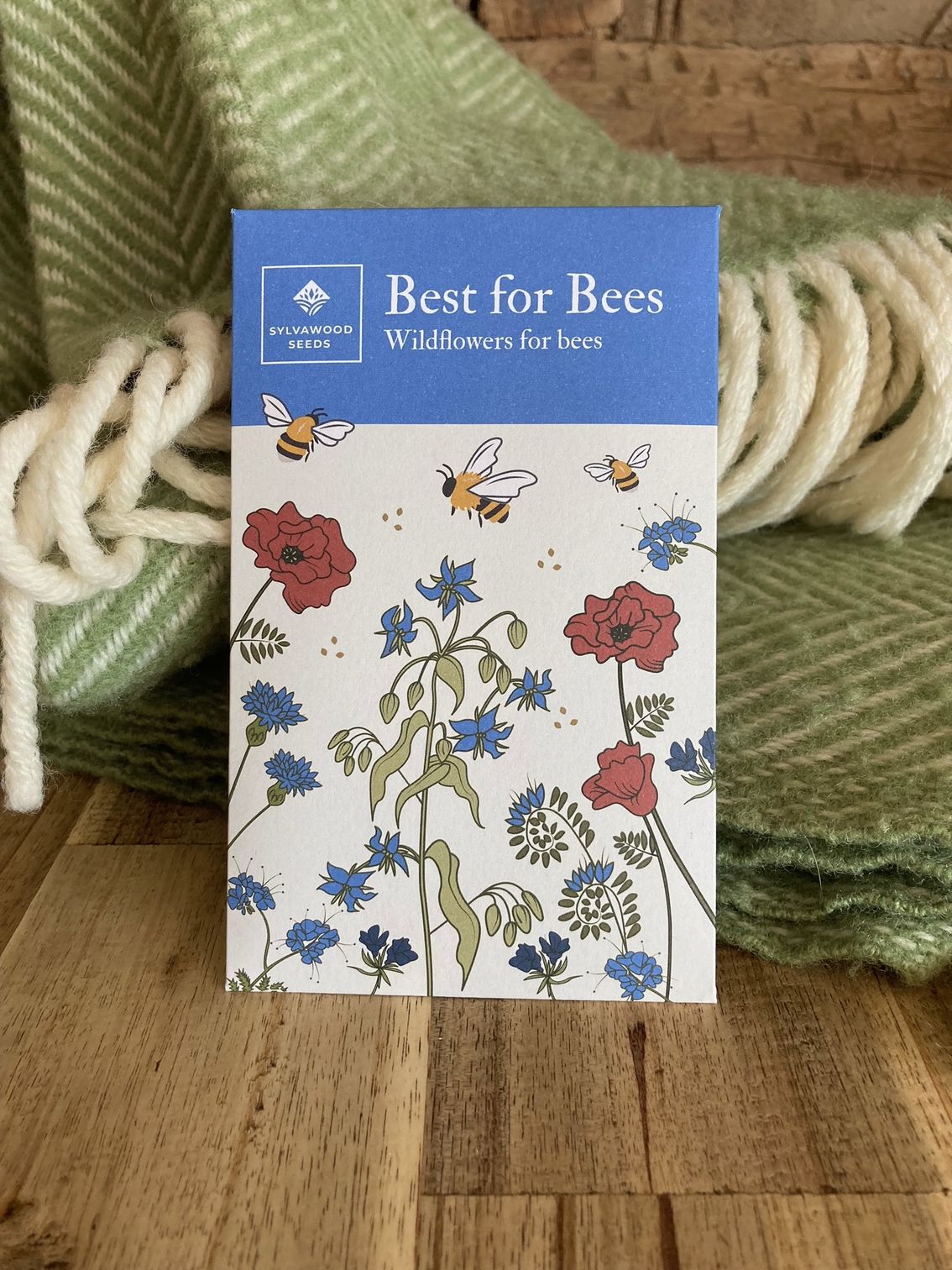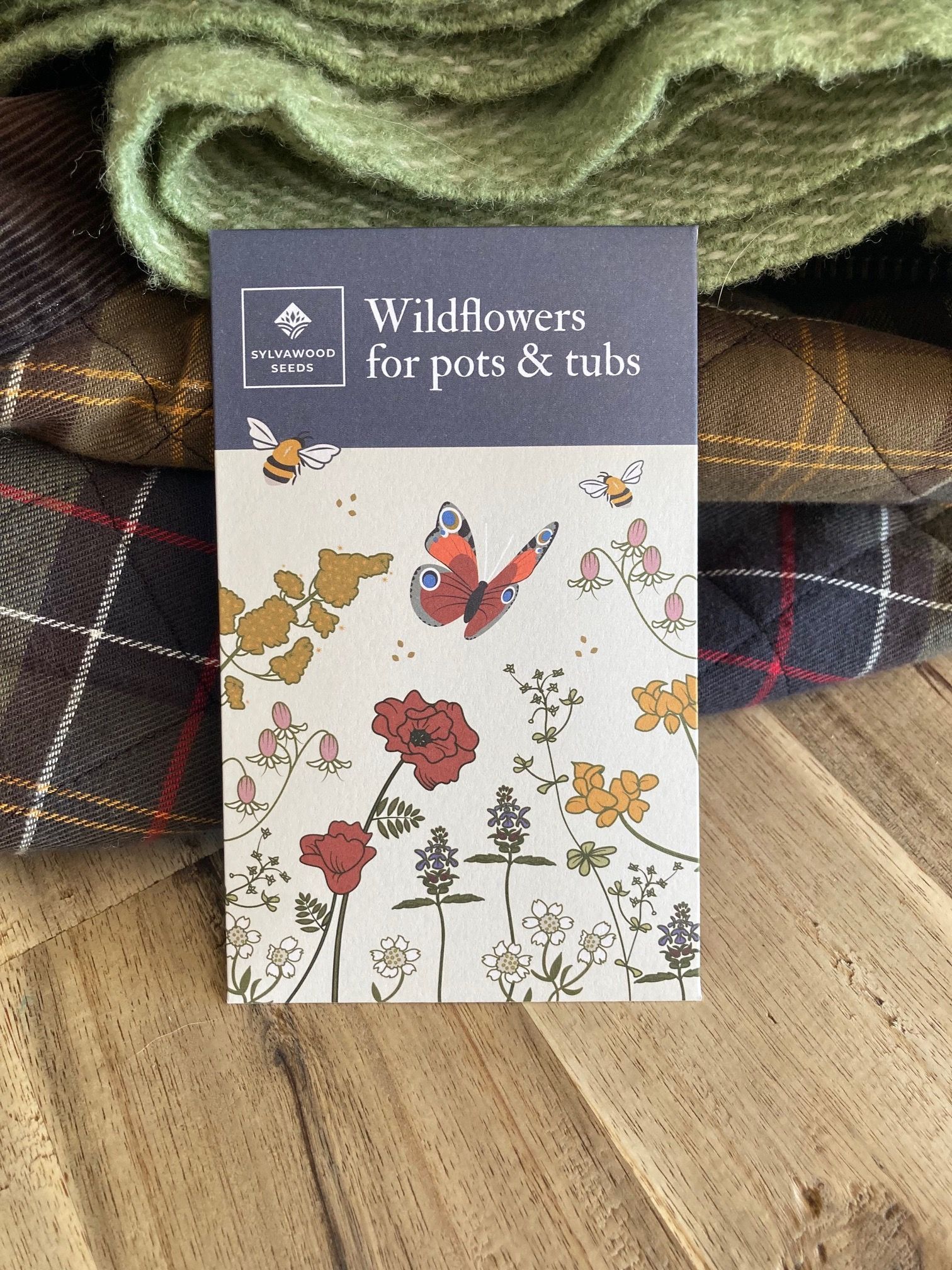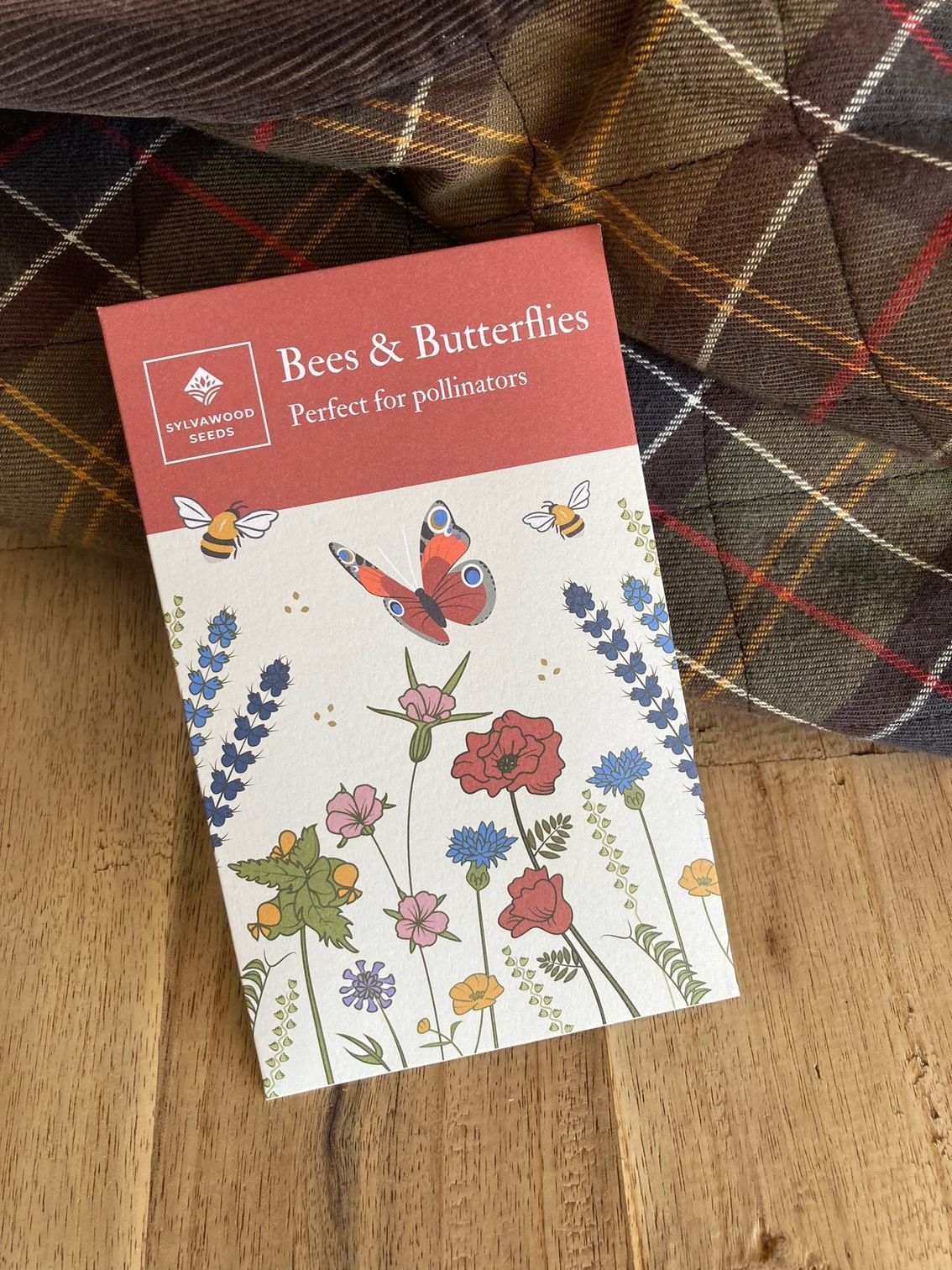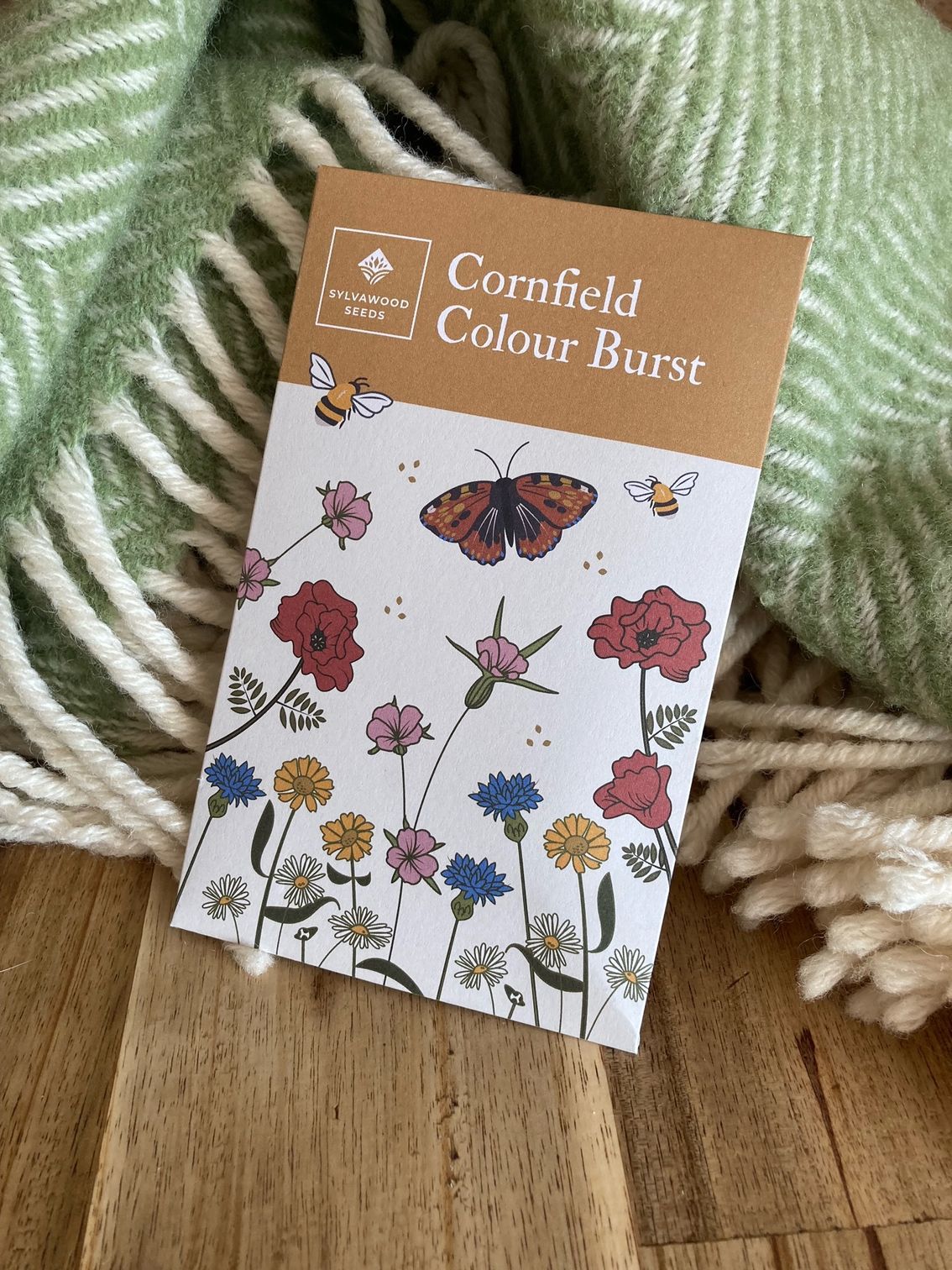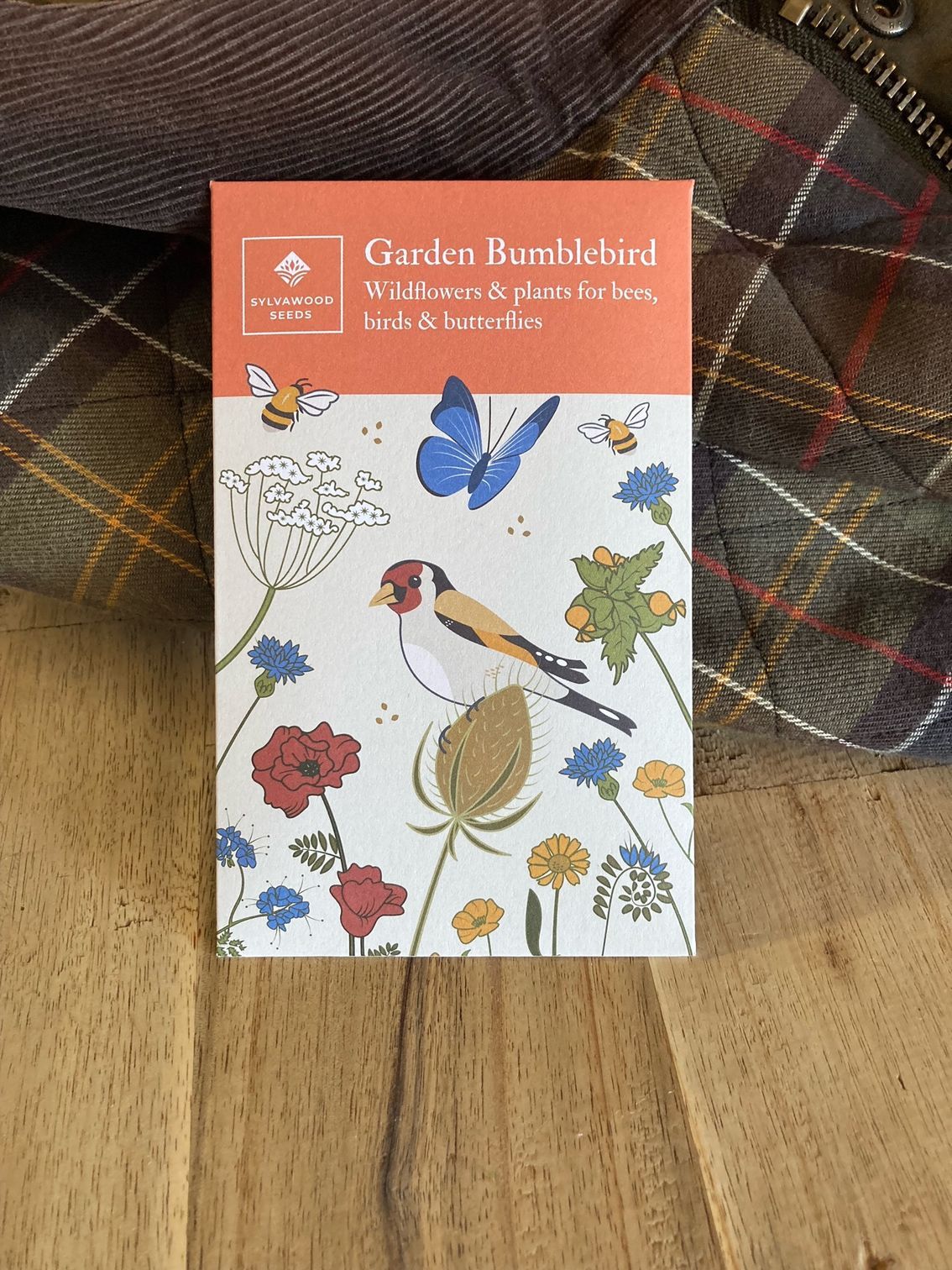Our wildflower seed packs are made from 100% FSC packaging and are fully recyclable
If you are a retailer and would like to discuss our range of branded and non branded packs, please contact us.
The illustrations on each packet have been hand drawn and created by our creative graphic designer. This represents some of the flowers that will grow from the seeds and help to feed and attract garden wildlife. They make the perfect gift for loved ones and will bring a large amount of colour to any garden.
FSC packaging
World Land Trust carbon balanced print
Vegan Society approved ink
Recyclable
We do not use any plastic in our packaging.
All of our packs are produced and packed in the UK
Our wildflowers seeds are carefully selected and grown in the UK
Best for Bees
The flowers are not only great for bees but will add loads of colour to your garden. Bees prefer blue flowers, so the Phacelia, Borage, Echium and Cornflower are a vibrant mix of blues, spiced up with rich-red Common Poppies.”
Sow the seeds evenly over a sunny area of your garden that you have dug over, raked and weeded. This pack will cover an area of about 5 square metres so if your patch is smaller, decrease the sowing rate accordingly.
After sowing, lightly tread or roll the seed area to ensure the seed is in good contact with the soil, and keep it watered until the plants are established. Allow the flowers to bloom and release their seeds back into the soil. Cut them down to the ground as the plants die off, and remove the cuttings onto the compost heap or into your green bin.
- Sow outdoors between March and May, or August to October.
- Plants will flower between May and September.
- All seeds UK grown.
- This 5g pack will cover approx. 5 square metres of ground.
- The plants will grow up to 1.2 metres tall in very rich soil, but in most gardens will grow to about knee height.
- Fully recyclable paper packaging, printed with vegetable based inks.
- Seeds grown without any pesticides.
If you want to grow this mix again in the same patch next year, just cultivate the ground in the same way, removing any weeds, before sowing a fresh packet.
Contents: 30% Cornflower, 30% Phacelia tanacetifolia, 20% Borage, 10% Echium 'Blue Bedder', 10% Poppy *
*Contents may vary.
Wildflowers for pots & tubs
Planting and growing wildflowers in pots couldn't be easier with this great mix of perennial and annual wildflower species sown at 1/2g per square metre in pots or tubs. This gives homeowners with smaller gardens, the opportunity to create their own wildflower areas without taking up too much space. This mix produces lovely flowers that will help to feed bees and butterflies.
Sow the seeds into a well prepared, weed-free seed bed. Lightly tread or roll the seed area and keep it watered until established. Allow the flowers to mature and self-seed. Trim back and remove the cuttings when self-seeding has taken place.
• Plant outdoors between March and October.
• Plants will flower between May and September.
• Made in the UK.
• Perennial and annual seeds.
• This 4g pack will cover approx. 8 square metres of soil in pots or tubs.
• Plants will grow up to 1.2 metres tall.
• Fully recyclable paper packaging, printed with vegetable based inks.
Contents: 18% Bladder Campion, 14% Self-heal, 16% Birdsfoot Trefoil, 14% Lady’s Bedstraw, 8% Red Clover, 8% Poppy, 6% Betony, 8% Sneezewort, 6% Hedge Bedstraw *
*Contents may vary.
Bees & Butterflies with or without grass
This is a colourful mix of perennial and annual wildflower seeds that has been chosen to grow in most soils. The seed mix with grass includes 20% native grasses that are beneficial to meadow butterflies. This mix produces high levels of nectar and pollen and is perfect for pollinators.
Sow the seeds evenly over a sunny area of your garden that you have dug over, raked and weeded. This pack will cover an area of about 3 square metres so if your patch is smaller, decrease the sowing rate accordingly.
After sowing, lightly tread or roll the ground to ensure the seed is in good contact with the soil, and keep it watered until the plants are established.
We’ve specially selected plants that are known to be good for bees and butterflies, whether as nectar plants for the adults such as Greater Knapweed or Field Scabious, or for butterfly caterpillars such as Common Sorrel for Small Copper, Garlic Mustard for Orange-tip or Bird’s-foot Trefoil for Common Blue. Together with the wild grasses, this should create the effect of a very flowery meadow.
The pack contains some annual cornflower seeds such as Common Poppy and Cornflower that will flowers in the first summer, so allow them to bloom and release their seeds back into the soil. Then mow or cut the area with shears in August or September and remove the cuttings onto the compost heap or into your green bin.
In future years, the area can be mown in March, then left unmown through the summer, and cut again from late summer through to autumn, always removing the clippings. The amount of colourful annuals (poppies etc) will naturally decrease over time – that’s natural.
- Sow outdoors between March and May, or August to October.
- The plants will flower between May and September.
- All seed grown in the UK.
- A mix of annual and perennial seeds.
- 80% wildflowers, 20% wild grasses. Or a 100% wildflower option
- This 6g pack will cover approx. 3 square metres of ground.
- Plants will grow up to 1.2 metres tall.
- Fully recyclable paper packaging, printed with vegetable based inks.
- Seeds grown without any pesticides
Contents (wildflowers): 20% Cornflower, 13% Corncockle, 5% Yellow Rattle, 5% Vipers Bugloss, 5% Greater Knapweed, 5% Field Scabious, 5% Meadow Buttercup, 5% Birdsfoot Trefoil, 4% Common Vetch, 4% Tufted Vetch, 4% Garlic Mustard, 2% Marjoram, 2% Devils-bit Scabious, 4% Poppy, 3% Meadow Cranesbill, 2% Red Campion, 2% Hedge Bedstraw, 2% Wild Carrot, 2% Kidney Vetch, 2% Corn Marigold, 1% Nettle-leaved Bellflower, 1% Betony, 1% Purple Loosestrife, 1% Common Sorrel.*
Contents (grass) if applicable: 50% Red Fescue, 25% Crested Dogstail, 15% Sweet Vernal Grass, 10% Common Bent. *
*Contents may vary.
Cornfield Colour Burst
A beautiful mix of classic annual wildflower species that will give a burst of colour in your garden throughout the summer months. This seed mix will attract pollinators and help to feed our bees.
These flowers were once widespread in among cereal crops, but herbicides have removed most of them from the countryside, depriving bees and hoverflies of nectar and pollen and birds of their seeds. This is an easy way to put some of that value back.
The mix includes the rich-red of Common Poppies, sunshine yellow of Corn Marigold, pink of Corncockle and stunning blue of Cornflower.
Sow the seeds evenly over a sunny area of your garden that you have dug over, raked and weeded. This pack will cover an area of about 5 square metres so if your patch is smaller, decrease the sowing rate accordingly.
After sowing, lightly tread or roll the seed area to ensure the seed is in good contact with the soil, and keep it watered until the plants are established. Allow the flowers to bloom and release their seeds back into the soil. Cut them down to the ground as the plants die off, and remove the cuttings onto the compost heap or into your green bin.
If you want to repeat the following year, repeat the instructions with a new packet of seeds. Some of the previous year’s seeds may also germinate.
- Sow outdoors between March and May or August to October.
- Plants will flower between May and September.
- All seeds grown in the UK.
- Annual seeds.
- This 5g pack will cover approx. 5 square metres of ground.
- Plants will grow up to 1.2 metres tall.
- Fully recyclable paper packaging, printed with vegetable based inks.
- Seeds grown without any pesticides
Contents: 30% Cornflower, 20% Corncockle, 20% Corn Marigold, 20% Corn Chamomile, 10% Poppy. *
*Contents may vary.
Garden Bumblebird
A great combination of colourful perennial and annual wildflowers and seed-bearing plants. With this combination of nectar and seeds, bees, birds and butterflies can benefit and will create a beautiful display in your garden throughout the summer months.
Sow the seeds evenly over a sunny area that you have dug over, raked and weeded. This pack will cover an area of about 5 square metres so if your patch is smaller, decrease the sowing rate accordingly.
After sowing, lightly tread or roll the seed area to ensure the seed is in good contact with the soil, and keep it watered until the plants are established. Allow the flowers to bloom and release their seeds back into the soil. Cut them down to the ground as the plants die off, and remove the cuttings onto the compost heap or into your green bin.
You can then just let the mix flower in subsequent years, although the proportion of colourful annuals in the mix is likely to decrease each year. If you wish, you can top them up by scattering seeds in spring from our Cornfield Colourburst or Best for Bees packs into any gaps where the soil is showing..
- Sow outdoors between March ad May or August to October.
- Plants will flower between May and September.
- All seeds grown in the UK.
- Perennial and annual seeds.
- This 5g pack will cover approx. 5 square metres of ground.
- Plants will grow up to 1.2 metres tall.
- Fully recyclable paper packaging, printed with vegetable based inks.
- Seeds grown without any pesticides
Contents: 15% Cornflower, 15% Phacelia tanacetifolia, 5% Poppy, 10% Common Knapweed, 7% Flax, 5% Corn Marigold, 5% Yellow Rattle, 5% Field Scabious, 5%Teasel, 5% Borage, 5% Red Clover, 5% Wild Carrot, 5% Bird’s-foot Trefoil, 3% Crimson Clover, 3% Greater Knapweed, 2% Rough Hawkbit *
*Contents may vary.
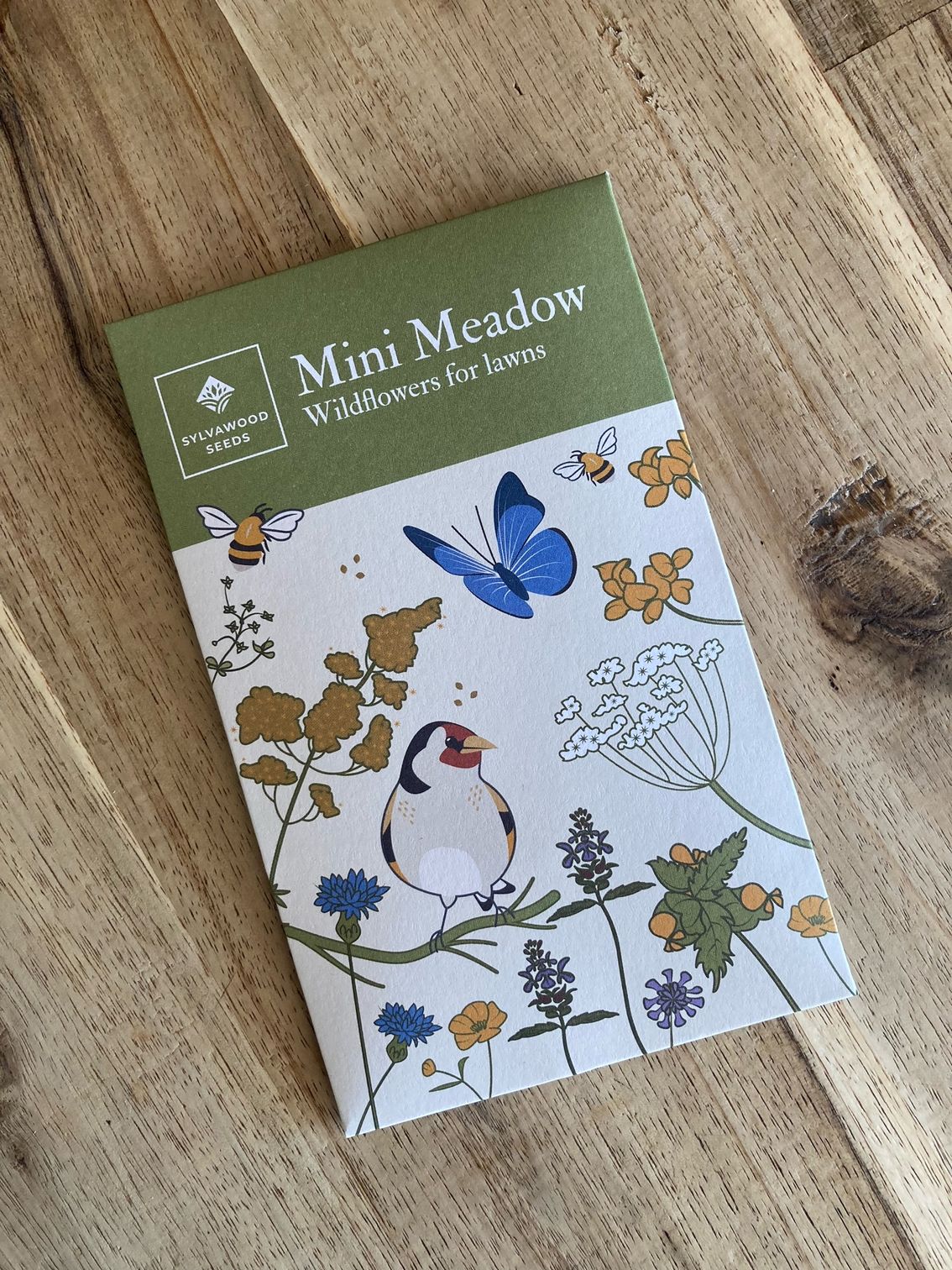
Mini Meadow
We’ve carefully formulated this seedmix so that you can sow it straight over an existing garden lawn to increase its diversity and value for wildlife in a quick, cheap and easy way.
We’ve lost a staggering 97% of our flower-rich meadows in the UK since the 1930s.
The mix contains a rich mix of perennial and annual wildflower species such as bird’s-foot trefoil and lady’s bedstraw, plus ‘the meadow maker’, yellow rattle, which helps suppress the vigour of the grass to allow the wildflowers to survive.”
To make your mini meadow, mow an area of garden lawn as short as possible, then scarify (scratch) it with a rake to expose little bits of soil (it will look a bit ravaged at this point, but don’t worry – it is vital to give the seeds a chance to germinate), and remove all clippings/raked vegetation onto the compost. Sow the seeds at 1g per sqm and water.
Allow the area of lawn to grow without mowing until late July/August. Then mow and keep doing so through the autumn if it needs it. Always remove all the clippings. The wildflowers may not flower in the lawn until the second year, so be patient! One established, they should be there for good. Remember, this is a haymeadow mix, so doesn’t contain colourful annuals such as poppies – the flowers are beautiful and extremely beneficial to wildlife but this mix isn’t about colour fireworks!
- Sow outdoors between March and May, or August to October.
- Plants will flower between May and September.
- All seeds grown in the UK.
- Contains a mix of perennial and annual seeds.
- This 5g pack will cover approx. 5 square metres.
- Plants will grow up to 1.2 metres tall.
- Fully recyclable paper packaging, printed with vegetable based inks.
- All seeds grown without pesticides
Contents: 10% Yellow Rattle, 8% Bird's-foot Trefoil, 8% Lady's Bedstraw, 5% Rough Hawkbit, 10% Wild Carrot, 6% Yarrow, 8% Hedge Bedstraw, 10% Meadow Buttercup, 8% Self-heal, 8% Common Knapweed, 6% Field Scabious, 5% Common Sorrel, 4% White Clover, 4% Red Clover *
*Contents may vary.
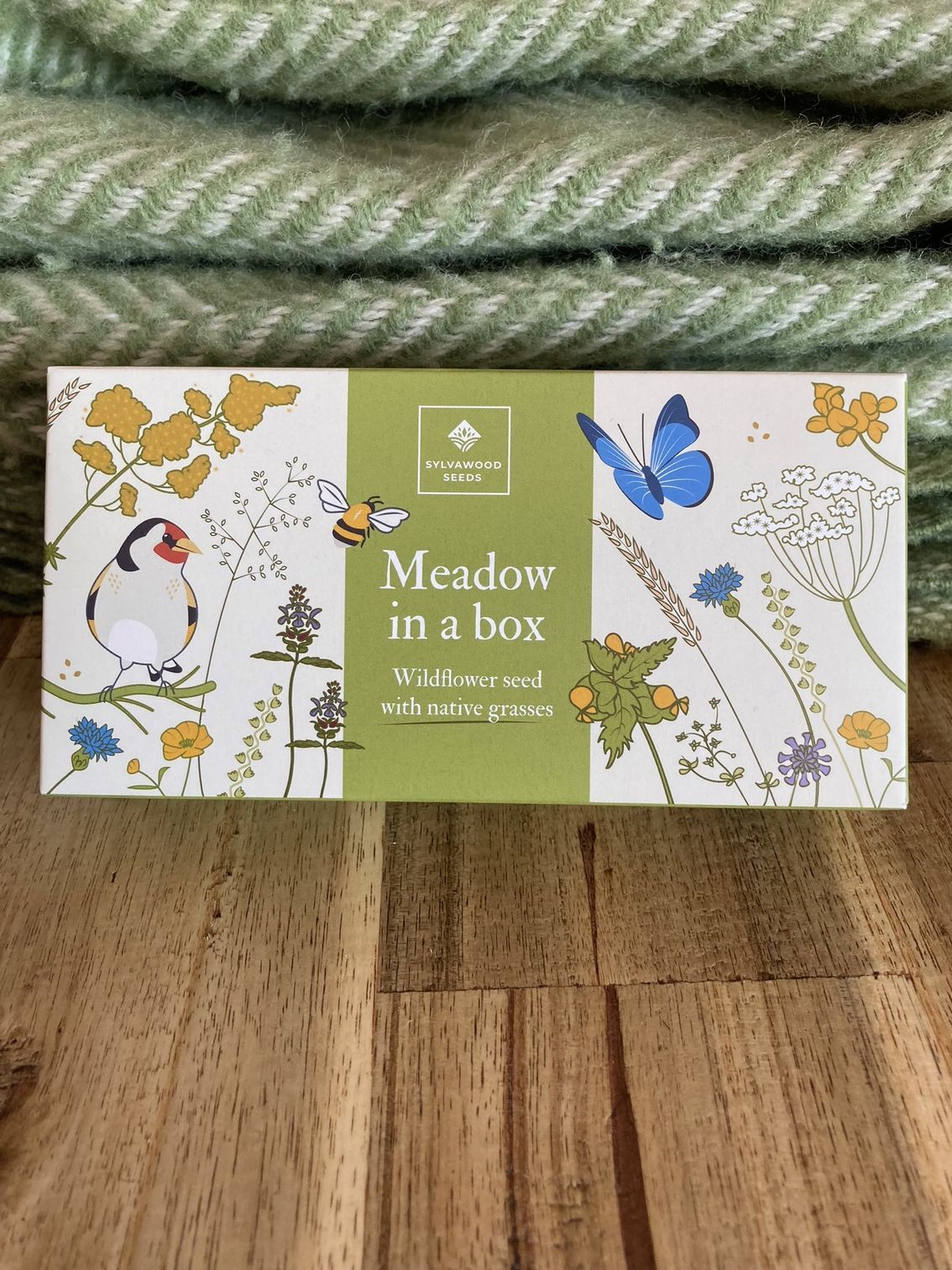
Meadow in a box
A mini meadow seed box with a combination of native meadow grass and perennial & annual wildflower species to create your own mini meadow. 20g of seed will cover an area of 6-7 square metres, and can be created over an existing lawn or on bare soil.
Wildflower meadows are some of our richest wildlife habitats, especially for butterflies, but they are almost totally lost from our landscapes. Creating your own wildflower meadow area will help so much wildlife, from bees that will nectar at the flowers to birds that will benefit from the insects and seeds.
You can make your mini-meadow in two ways:
On an existing sunny lawn, mow your chosen area as short as possible, then scarify (scratch) it with a rake to expose little bits of soil (it will look a bit ravaged at this point, but don’t worry – it is vital to give the seeds a chance to germinate), and remove all clippings/raked vegetation onto the compost.
Elsewhere in the garden or dig, thoroughly weed and rake an area of ground, ideally in a sunny position.
Then sow the seeds at 3g per sqm and water. Mow (and always remove the cuttings) every late summer through autumn. Remember, this is a haymeadow mix, so doesn’t contain colourful annuals such as poppies – the flowers are beautiful and extremely beneficial to wildlife but this mix isn’t about colour fireworks!
- Sow outdoors between March and October.
- Plants will flower between May and September.
- Made in the UK.
- Perennial and annual seeds.
- This 20g pack will cover approx. 6 square metres.
- Plants will grow up to 1.2 metres tall.
- 80% of this mix is grasses, 20% is wildflowers.
- Fully recyclable paper packaging, printed with vegetable based inks.
- All seeds grown without pesticides.
Wildflowers: 10% Yellow Rattle, 10% Meadow Buttercup, 10% Wild Carrot, 8% Bird's-foot Trefoil, 8% Lady's Bedstraw, 8% Hedge Bedstraw, 8% Self-heal, 8% Common Knapweed, 6% Yarrow, 6% Field Scabious, 5% Rough Hawkbit, 5% Common Sorrel, 4% White Clover, 4% Red Clover.
Grasses: 40% Red Fescue, 27% Slender Creeping Red Fescue, 15% Crested Dog’s-tail, 10% Smooth-stalked Meadow-grass, 5% Common Bent, 3% Sweet Vernal Grass.*
*Contents may vary.
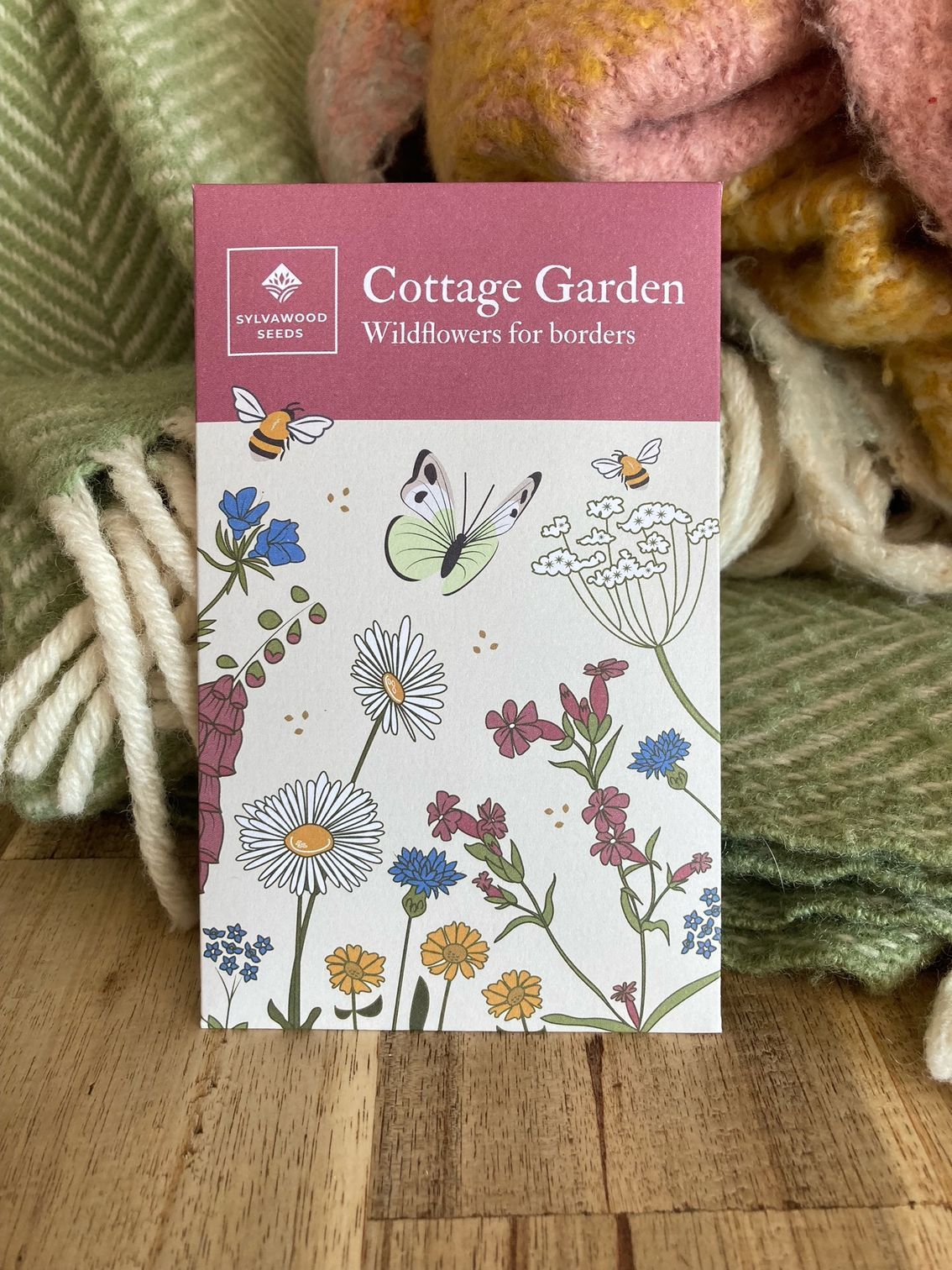
Cottage Garden Wildflowers
A great combination of colourful perennial and annual wildflowers for that Cottage Garden look. With this combination of seeds, bees, birds and butterflies can benefit and will create a beautiful display in your garden throughout the summer months.
Sow the seeds evenly over a sunny area that you have dug over, raked and weeded. This pack will cover an area of about 5 square metres so if your patch is smaller, decrease the sowing rate accordingly.
After sowing, lightly tread or roll the seed area to ensure the seed is in good contact with the soil, and keep it watered until the plants are established. Allow the flowers to bloom and release their seeds back into the soil. Cut them down to the ground as the plants die off, and remove the cuttings onto the compost heap or into your green bin.
You can then just let the mix flower in subsequent years, although the proportion of colourful annuals in the mix is likely to decrease each year.
- Sow outdoors between March ad May or August to October.
- Plants will flower between May and September.
- All seeds grown in the UK.
- Perennial and annual seeds.
- This 5g pack will cover approx. 5 square metres of ground.
- Plants will grow up to 1.2 metres tall.
- Fully recyclable paper packaging, printed with vegetable based inks.
- Seeds grown without any pesticides
Contents: Cornflower 20%, Corn Marigold 15%, Echium Vulgare 15%, Oxeye daisy 10%, Borage 5%, Red Campion 5%, White Campion 5%, Wild Carrot 5%, Poppy 5%, , Chicory 4%, Forget-me-Not 4%, Foxglove 4%, Meadow Vetchling 3%
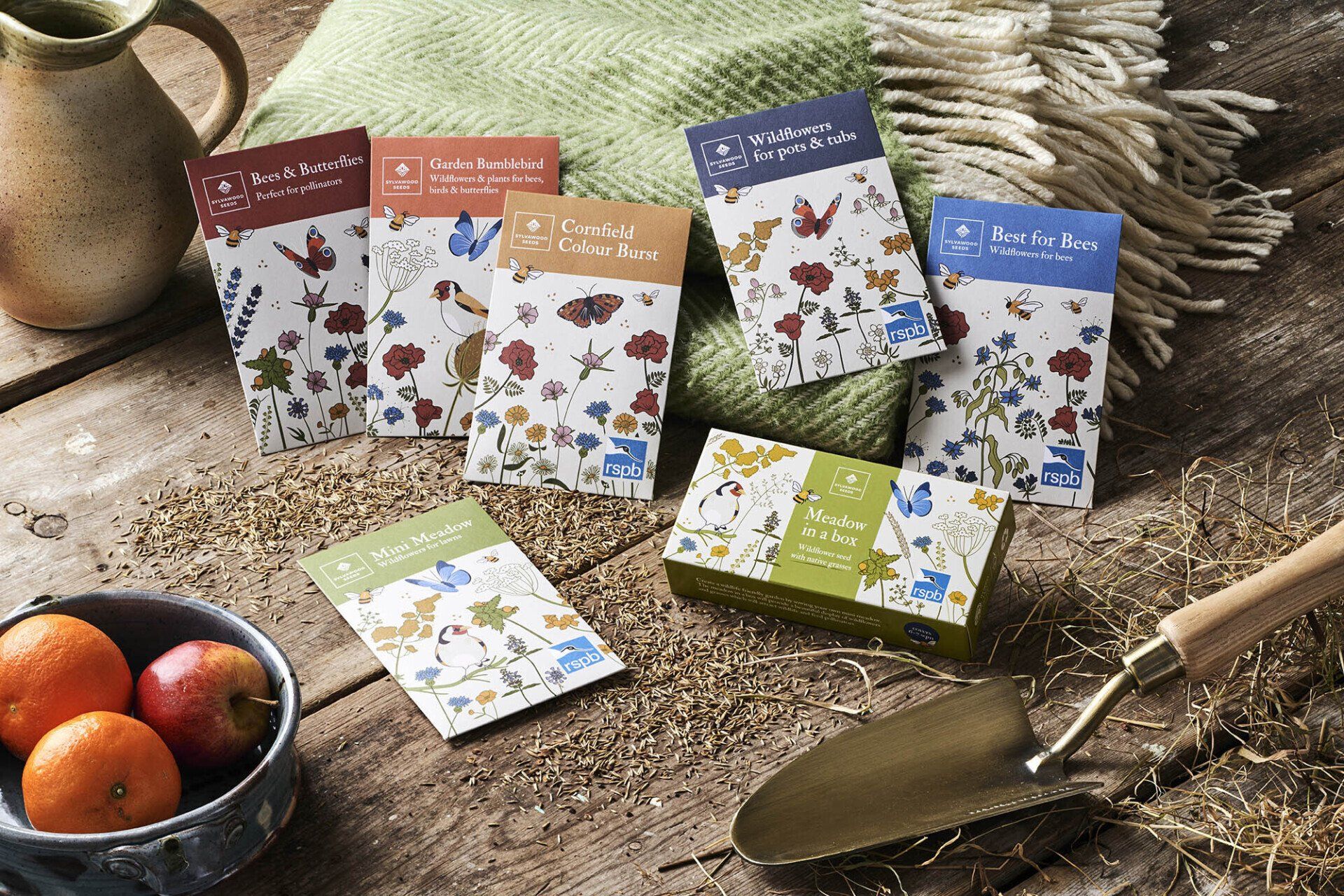
We also supply a full range of wildflower seeds for every application including meadows, verges, amenity and business recreational areas. Please contact us for more information.
All Rights Reserved Sylvawood Seeds
Sylvawood Seeds is a trading name of Sylvawood Agriculture Ltd
